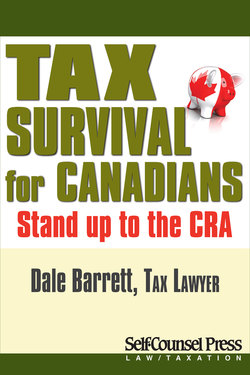Читать книгу Tax Survival for Canadians - Dale Barrett - Страница 19
На сайте Литреса книга снята с продажи.
1. The Importance of Maintaining Complete and Organized Records
ОглавлениеThere are a variety of reasons that should convince a taxpayer to maintain complete and organized records. There are laws enacted by Parliament that compel the taxpayer to keep such records in order to stay on the right side of the law. For example, I once had a client who should have kept his receipts as required to prove his expenses. About two years after his return had been processed the CRA chose to question a $1,500 receipt for a particular contractor. Since the taxpayer did not have the receipt in question, he was not able to produce it.
In most cases what would typically happen is that the auditor would deny the expense and reassess the taxpayer for additional taxes owing. In this case, however, the auditor was determined to obtain the receipt from the taxpayer — at any cost. When the taxpayer failed to provide the receipt through the auditor’s use of section 231.1 of the ITA, which entitles the auditor to inspect or examine records for the purpose of administration and enforcement of the act, the auditor used his powers under sections 231.2 and 231.6 of the act, to issue a “Requirement to Provide Information.” Differing from a general “Request” for information which is initially provided at the onset of the audit — and is expected to be voluntarily complied with to the best of one’s ability — a “Requirement” for information under section 231.2 of the act compels a taxpayer to provide the information or possibly be charged for unlawfully failing to provide it.
As my client did not have the receipt in question, he was not able to provide it, despite the requirement. I will never know if this receipt actually existed, or whether the expense was fabricated, but my client insisted that it was a legitimate expense and that he simply did not hold onto the receipt. In the end, the auditor recommended that my client be charged as a criminal, and a summons was delivered to his home by a police officer. This is when I was approached with the grim task of defending this taxpayer in the same courtroom with drug dealers and thieves. Had my client held onto the necessary documents as required in order to satisfy the law, he would not have been left in this particular predicament.
The following requires a taxpayer to maintain complete and organized records:
• Income Tax Act (ITA)
• Excise Tax Act (ETA)
• Excise Act, 2001 (EA 2001)
• Employment Insurance Act (EIA)
• Canada Pension Plan (CPP)
• Softwood Lumber Products Export Charge Act, 2006 (SLPECA)
• Air Travellers Security Charge Act (ATSCA)
Benefits for maintaining complete and organized records include:
• Helping the taxpayer to determine what taxes are owed.
• Making it easier for a person to identify his or her sources of income.
• Acting as reminders of tax credits to be claimed and expenses to be deducted.
• In case of future audit of returns, allowing the taxpayer to substantiate and prevent disallowances of his or her expenses, and prove his or her income.
Many people are not sure of what kind of records to keep, or how they should be kept. Regardless of how much a taxpayer knows about record keeping, in order to stay on the right side of the CRA, it is best to consult the CRA document RC4409, “Keeping Records,” for guidance. Everything a taxpayer could possibly want to know about record keeping is provided in this guide, and it is an invaluable resource for all businesses and self-employed individuals. It deals with paper and electronic record keeping, as well as record keeping for payroll and GST or HST.
If you keep electronic records, you may be asked to provide documents to support your entries, so it is important to also keep all of your receipts, bank statements, deposit slips, cancelled cheques, and all other important documents. Most importantly, don’t find yourself in the position in which a great number of my clients have found themselves — realize that computers crash, and hard drives are temporary. Back up your business records regularly. A crashed computer without a backup can cost you thousands in extra taxes. Your lack of data gives the auditor free reign to deny all your expenses that relied on the electronic data as proof.
